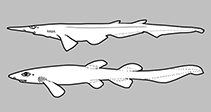Parmaturus nigripalatum Fahmi & Ebert, 2018
Indonesian filetail catshark
Upload your photos and videos
Pictures | Google imageNo image available for this species;
drawing shows typical species in Pentanchidae.
Pictures | Google imageNo image available for this species;
drawing shows typical species in Pentanchidae.
Common names from other countries
Classification / Names Common names | Synonyms | Catalog of Fishes(genus, species) | ITIS | CoL | WoRMS | Cloffa
Elasmobranchii (sharks and rays) > Carcharhiniformes (Ground sharks) > Pentanchidae (Deepwater catsharks)
Etymology: Parmaturus: parma (L.), from parme (Gr.), small shield; oura (Gr.), tail, presumably referring to upper edge of caudal fin “armed with modified” scales (per Garman 1913) (See ETYFish); nigripalatum: nigra (L.), black or dark; palatum (L.), palate, referring to distinctive blackish color of roof of mouth (See ETYFish).
Etymology: Parmaturus: parma (L.), from parme (Gr.), small shield; oura (Gr.), tail, presumably referring to upper edge of caudal fin “armed with modified” scales (per Garman 1913) (See ETYFish); nigripalatum: nigra (L.), black or dark; palatum (L.), palate, referring to distinctive blackish color of roof of mouth (See ETYFish).
Environment: milieu / climate zone / depth range / distribution range Ecology
Marine; bathydemersal; depth range 170 - 190 m (Ref. 119153). Tropical
Distribution Countries | FAO areas | Ecosystems | Occurrences | Point map | Introductions | Faunafri
Eastern Indian Ocean: Indonesia (Sumbawa I.); possibly be more widespread in the region.
Size / Weight / Age
Short description Identification keys | Morphology | Morphometrics
This moderate-sized species is distinguished by the following characters: slender body has soft-velvety skin, where dermal denticles on side and upper body are tricuspidate; coloration of body uniformly plain medium brown; head slightly depressed; snout is relatively short; mouth curved, the upper and lower labial furrows are conspicuous with the uppers and lowers of equal lengths; roof of mouth blackish with darker pores; teeth are mainly tricuspidate with greatly elongate median cusps, about 50 rows in both jaws; origin of the first dorsal fin is posterior to the insertion of the pelvic fins, pre-first dorsal fin is slightly posterior of body mid-length; origin of the second dorsal fin is posterior to mid-length of anal fin base; pelvic fins origin and vent are slightly posterior to midlength; second dorsal fin is slightly larger than first; caudal peduncle is relatively short, pronounced caudal crests on upper and lower anterior caudal fin margins has enlarged denticles; vertebral counts monospondylous centra 42, precaudal centra 90 (Ref. 119153).
Life cycle and mating behavior Maturity | Reproduction | Spawning | Eggs | Fecundity | Larvae
Main reference
Upload your references | References | Coordinator | Collaborators
Fahmi and D.A. Ebert, 2018. Parmaturus nigripalatum n. sp., a new species of deep-sea catshark (Chondrichthyes: Carcharhiniformes: Scyliorhinidae) from Indonesia. Zootaxa 4413(3):531-540. (Ref. 119153)
IUCN Red List Status (Ref. 130435: Version 2024-1)
Data deficient (DD) ; Date assessed: 22 November 2019
Threat to humans
Harmless
Human uses
FAO(Publication : search) | FishSource |
More information
Trophic ecology
Food items
Diet composition
Food consumption
Food rations
Predators
Food items
Diet composition
Food consumption
Food rations
Predators
Ecology
Ecology
Home ranges
Ecology
Home ranges
Population dynamics
Growth parameters
Max. ages / sizes
Length-weight rel.
Length-length rel.
Length-frequencies
Mass conversion
Recruitment
Abundance
Growth parameters
Max. ages / sizes
Length-weight rel.
Length-length rel.
Length-frequencies
Mass conversion
Recruitment
Abundance
Life cycle
Reproduction
Maturity
Fecundity
Spawning
Spawning aggregations
Eggs
Egg development
Larvae
Larval dynamics
Reproduction
Maturity
Fecundity
Spawning
Spawning aggregations
Eggs
Egg development
Larvae
Larval dynamics
Anatomy
Gill area
Brain
Otolith
Gill area
Brain
Otolith
Physiology
Body composition
Nutrients
Oxygen consumption
Swimming type
Swimming speed
Visual pigments
Fish sound
Diseases & Parasites
Toxicity (LC50s)
Body composition
Nutrients
Oxygen consumption
Swimming type
Swimming speed
Visual pigments
Fish sound
Diseases & Parasites
Toxicity (LC50s)
Genetics
Genetics
Heterozygosity
Heritability
Genetics
Heterozygosity
Heritability
Human related
Aquaculture systems
Aquaculture profiles
Strains
Ciguatera cases
Stamps, coins, misc.
Aquaculture systems
Aquaculture profiles
Strains
Ciguatera cases
Stamps, coins, misc.
Tools
E-book | Field guide | Length-frequency wizard | Life-history tool | Point map | Classification Tree
| Catch-MSY |
Special reports
Download XML
Internet sources
Aquatic Commons | BHL | Cloffa | Websites from users | Check FishWatcher | CISTI | Catalog of Fishes(genus, species) | DiscoverLife | ECOTOX | Faunafri | Fishtrace | GenBank(genome, nucleotide) | GloBI | GOBASE | | Google Books | Google Scholar | Google | IGFA World Record | MitoFish | Otolith Atlas of Taiwan Fishes | PubMed | Reef Life Survey | Scirus | SeaLifeBase | Tree of Life | Wikipedia(Go, Search) | World Records Freshwater Fishing | Zoobank | Zoological Record
Estimates based on models
Phylogenetic diversity index (Ref. 82804): PD50 = 0.5010 [Uniqueness, from 0.5 = low to 2.0 = high].
Bayesian length-weight: a=0.01122 (0.00514 - 0.02450), b=3.04 (2.87 - 3.21), in cm Total Length, based on all LWR estimates for this body shape (Ref. 93245).
Trophic level (Ref. 69278): 4.1 ±0.6 se; based on size and trophs of closest relatives
Resilience (Ref. 120179): High, minimum population doubling time less than 15 months (Preliminary K or Fecundity.).
Fishing Vulnerability (Ref. 59153): Moderate vulnerability (42 of 100).




